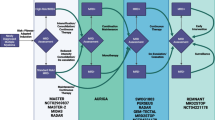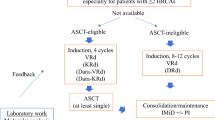Abstract
The majority of patients with advanced Hodgkin lymphoma are cured with current standard therapy such as Adriamycin, bleomycin, vinblastine, and dacarbazine (ABVD). However, almost 20 % of patients fail to achieve complete remission, and depending upon risk group, 20–30 % experience relapse with prolonged follow-up. BEACOPP (bleomycin, etoposide, Adriamycin, cyclophosphamide, prednisone, procarbazine) was developed by the German Hodgkin Study Group (GHSG) to improve upon standard therapy by intensifying treatment and substituting etoposide and procarbazine for vinblastine and dacarbazine, respectively. In the HD9 trial, escalated BEACOPP was shown to be superior to COPP/ABVD with regard to time to treatment failure, but was associated with increased risk of secondary malignancies. Modifications of BEACOPP were developed to maintain efficacy while reducing the adverse effects. While several randomized trials have confirmed prolongation of progression-free survival with BEACOPP compared to ABVD, a survival advantage has been difficult to demonstrate. Given the comparable survival between BEACOPP and ABVD, as well as the greater toxicities of the former, including infertility, myelosuppression, and secondary malignancies, ABVD should remain the standard regimen for patients in the U.S. Newer regimens incorporating novel agents such as brentuximab vedotin may further improve the efficacy of current regimens.
Similar content being viewed by others
References
DeVita Jr VT, Serpick AA. Combination chemotherapy in the treatment of advanced Hodgkin's disease. Ann Intern Med. 1970;73:881–95.
DeVita Jr VT, Simon RM, Hubbard SM, et al. Curability of advanced Hodgkin's disease with chemotherapy. Long-term follow-up of MOPP-treated patients at the National Cancer Institute. Ann Intern Med. 1980;92:587–95.
Santoro A, Bonadonna G, Bonfante V, et al. Alternating drug combinations in the treatment of advanced Hodgkin's disease. N Engl J Med. 1982;306:770–5.
Bonadonna G, Zucali R, Monfardini S, et al. Combination chemotherapy of Hodgkin's disease with adriamycin, bleomycin, vinblastine, and imidazole carboxamide versus MOPP. Cancer. 1975;36:252–9.
Canellos GP, Anderson JR, Propert KJ, et al. Chemotherapy of advanced Hodgkin's disease with MOPP, ABVD, or MOPP alternating with ABVD. N Engl J Med. 1992;327:1478–84.
Duggan DB, Petroni GR, Johnson JL, et al. Randomized comparison of ABVD and MOPP/ABV hybrid for the treatment of advanced Hodgkin's disease: report of an intergroup trial. J Clin Oncol. 2003;21:607–14.
Diehl V, Sieber M, Rüffer U, et al. BEACOPP: an intensified chemotherapy regimen in advanced Hodgkin's disease. Ann Oncol. 1997;8:143–8.
Tesch H, Diehl V, Lathan B, et al. Moderate dose escalation for advanced stage Hodgkin's disease using the bleomycin, etoposide, adriamycin, cyclophosphamide, vincristine, procarbazine, and prednisone scheme and adjuvant radiotherapy: a study of the German Hodgkin's Lymphoma Study Group. Blood. 1998;92:4560–7.
Diehl V, Franklin J, Pfreundschuh M, et al. Standard and increased-dose BEACOPP chemotherapy compared with COPP-ABVD for advanced Hodgkin's disease. N Engl J Med. 2003;348:2386–95.
Sieber M, Bredenfield H, Josting A, et al. 14-day variant of the bleomycin, etoposide, doxorubicin, cyclophosphamide, vincristine, procarbazine, and prednisone regimen in advanced-stage Hodgkin's lymphoma: results of a pilot study of the German Hodgkin's Lymphoma Study Group. J Clin Oncol. 2003;21:1734–9.
Engert A, Bredenfield H, Döhner H, et al. Pegfilgrastim support for full delivery of BEACOPP-14 chemotherapy for patients with high-risk Hodgkin's lymphoma: results of a phase II study. Haematologica. 2006;91:546–9.
Borchmann P, Haverkamp H, Diehl V, et al. Eight cycles of esdalated-dose BEACOPP compared with four cycles of escalalated-dose BEACOPP followed by four cycles of baseline-dose BEACOPP with or without radiotherapy in patients with advanced-stage Hodgkin's lymphomaL final analysis of the HD12 trial of the German Hodgkin Study Group. J Clin Oncol. 2011;29:423404242.
Santoro A, Devizzi L, Bonfante V, et al: Phase II study with gemcitabine in pretreated patients with Hodgkin's (HD) and non-Hodgkin's lymphomas (NHL): results of a multicenter study. Proc ASCO 16:21a (abstr 71), 1997
Tesch H, Santoro A, Fiedler F, et al: Phase II study of gemcitabine in pretreated Hodgkin's disease: results of a multicenter study. Blood 90:339a (abstr 1514), 1997
Bredenfield H, Franklin J, Nogova L, et al. Severe pulmonary toxicity in patients with advanced-stage Hodgkin's disease treated with a modified bleomycin, doxorubicin, cyclophosphamide, vincristine, procarbazine, prednisone, and gemcitabine (BEACOPP) regimen is probably related to the combination of gemcitabine and bleomycin : a report of the Gerrman Hodgkin's Lymphoma Study Group. J Clin Oncol. 2004;22:2424–9.
Engert A, Haverkamp H, Kobe C, et al. Reduced-intensity chemotherapy and PET-guided radiotherapy in patients with advanced stage Hodgkin's lymphoma (HD15 trial): a randomised, open-label, phase 3 non-inferiority trial. Lancet. 2012;379:1791–9.
Engert A, Plutschow A, Eich HT, et al. Reduced treatment intensity in patients with early-stage Hodgkin's lymphoma. N Engl J Med. 2010;363:640–52.
Hasenclever D, Diehl V. A prognostic score for advanced Hodgkin's disease. N Engl J Med. 1998;339:1506–14.
Ballova V, Rüffer J-U, Haverkamp H, et al. A prospectively randomized trial carried out by the German Hodgkin Study Group (GHSG) for elderly patients with advanced Hodgkin's disease comparing BEACOPP baseline and COPP-ABVD (study HD9elderly). Ann Oncol. 2005;16:124–31.
Hartmann P, Rehwald U, Salzberger B, et al. BEACOPP therapeutic regimen for patients with Hodgkin's disease and HIV infection. Ann Oncol. 2003;14:1562–9.
Behringer K, Josting A, Schiller P, et al. Solid tumors in patients treated for Hodgkin's disease: a report from the German Hodgkin Lymphoma Study Group. Ann Oncol. 2004;15:1079–85.
Josting A, Wiedenmann S, Franklin J, et al. Secondary myeloid leukemia and myelodysplastic syndromes in patients treated for Hodgkin's disease: a report from the German Hodgkin's Lymphoma Study Group. J Clin Oncol. 2003;21:3440–6.
Behringer K, Mueller H, Georgen H, et al. Gonadal function and fertility in survivors after Hodgkin lymphoma treatment within the German Hodgkin Study Group HD13 to HD15 trials. J Clin Oncol. 2013;31:231–9.
Skoetz N, Trelle S, Rancea M, et al. Effect of initial treatment strategy on survival of patients with advanced-stage Hodgkin's lymphoma: a systematic review and network meta-analysis. Lancet Oncol. 2013;14:943–52.
Federico M, Bellei M, Cheson BD. BEACOPP or no BEACOPP? Lancet Oncol. 2013;14:e487–8.
Moccia AA, Donaldson J, Chhanabhai M, et al. International prognostic score in advanced-stage Hodgkin's lymphoma: altered utility in the modern era. J Clin Oncol. 2012;30:3383–8.
Cheson BD, Pfistner B, Juweid ME, et al. Revised response criteria for malignant lymphoma. J Clin Oncol. 2007;25:579–86.
Federico M, Luminari S, Iannitto E, et al. ABVD compared with BEACOPP compared with CEC for the initial treatment of patients with advanced Hodgkin's lymphoma: results from the HD2000 Gruppo Italiano per lo Studio dei Linfomi trial. J Clin Oncol. 2009;27:805–11.
Viviani S, Zinzani PL, Brusamolino E, et al. ABVD versus BEACOPP for Hodgkin's lymphoma when high-dose salvage is planned. N Engl J Med. 2011;365:203–12.
Carde PP, Karrasch M, Fortpied C, et al: ABVD (8 cycles) versus BEACOPP (4 escalated= > 4 baseline) in stage III-IV high-risk Hodgkin lymphoma (HL): first results of EORTC 20012 intergroup randomized phase III clinical trial. J Clin Oncol 30:abstract # 8002, 2012
Dann EJ, Bar-Shalom R, Tamir A, et al. Risk-adapted BEACOPP regimen can reduce the cumulative dose of chemotherapy for standard and high-risk Hodgkin lymphoma with no impairment of outcome. Blood. 2007;109:905–9.
Gallamini A, Patte C, Viviani S, et al. Early chemotherapy intensification with BEACOPP in advanced-stage Hodgkin lymphoma patients with an int4erim-PET positive after two ABVD courses. Br J Haematol. 2011;152:551–60.
Press OW, Li H, Schoder H, et al: Response adapted therapy of stage III-IV Hodgkin lymphoma based on interim FDG-PET imaging: early results of US Intergroup S0816. Haematologica 90:36 (abstract T108), 2013
Johnson P, Federico M, Fossa A, et al: Response rates and toxicity of response-adapted therapy in advanced Hodgkin lymphoma: initial results from the internationla RATHL study. Haematologica 98:2 (abstract# T003, 2013
Younes A, Gopal AK, Smith SE, et al. Results of a pivotal phase II study of brentuximab vedotin for patients with relapsed or refractory Hodgkin's lymphoma. J Clin Oncol. 2012;30:2183–9.
Younes A, Connors JM, Park SI, et al. Frontline therapy with brentuximab vedotin combined with ABVD or AVD in patients with newly diagnosed advanced stage Hodgkin lymphoma. Blood. 2011;118:436–7.
Compliance with Ethics Guidelines
ᅟ
Conflict of Interest
Dr. Bruce Cheson declares no potential conflicts of interest.
Human and Animal Rights and Informed Consent
This article does not contain any studies with human or animal subjects performed by any of the authors.
Author information
Authors and Affiliations
Corresponding author
Rights and permissions
About this article
Cite this article
Cheson, B.D. Which Hodgkin’s Patients in the Unites States Should Be Treated with BEACOPP?. Curr Hematol Malig Rep 9, 222–226 (2014). https://doi.org/10.1007/s11899-014-0213-6
Published:
Issue Date:
DOI: https://doi.org/10.1007/s11899-014-0213-6




